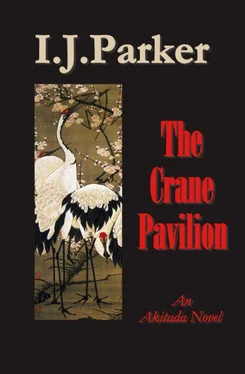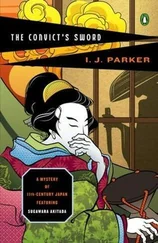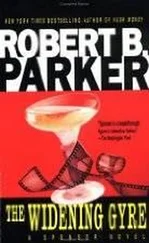I. Parker - The Crane Pavillion
Здесь есть возможность читать онлайн «I. Parker - The Crane Pavillion» весь текст электронной книги совершенно бесплатно (целиком полную версию без сокращений). В некоторых случаях можно слушать аудио, скачать через торрент в формате fb2 и присутствует краткое содержание. Жанр: Исторический детектив, на английском языке. Описание произведения, (предисловие) а так же отзывы посетителей доступны на портале библиотеки ЛибКат.
- Название:The Crane Pavillion
- Автор:
- Жанр:
- Год:неизвестен
- ISBN:нет данных
- Рейтинг книги:5 / 5. Голосов: 1
-
Избранное:Добавить в избранное
- Отзывы:
-
Ваша оценка:
- 100
- 1
- 2
- 3
- 4
- 5
The Crane Pavillion: краткое содержание, описание и аннотация
Предлагаем к чтению аннотацию, описание, краткое содержание или предисловие (зависит от того, что написал сам автор книги «The Crane Pavillion»). Если вы не нашли необходимую информацию о книге — напишите в комментариях, мы постараемся отыскать её.
The Crane Pavillion — читать онлайн бесплатно полную книгу (весь текст) целиком
Ниже представлен текст книги, разбитый по страницам. Система сохранения места последней прочитанной страницы, позволяет с удобством читать онлайн бесплатно книгу «The Crane Pavillion», без необходимости каждый раз заново искать на чём Вы остановились. Поставьте закладку, и сможете в любой момент перейти на страницу, на которой закончили чтение.
Интервал:
Закладка:
But he said nothing of this. Instead he changed the subject to Abbot Genshin’s charity. “How is it that all the residents live here by Abbot Genshin’s generosity?”
Koshiro said quickly, “I work here. I’m the caretaker of the property. This small house is part of my pay.”
The painter smirked. “Not that his work is very heavy, considering there are always people from the outside coming in to sweep and rake, to trim and tidy up. As for me? Yes, I have use of some space in one of the wings. I do my painting there and pay for its use by donating some of my work to the abbot’s temple.”
Koshiro snorted.
By now both men glared at each other, and Akitada decided to change the subject again. “Tell me what you know about Lady Ogata.”
The painter said, “She kept to herself. Well, we all do mostly. The student, of course, leaves for his classes. I think the nun might know more about her than the men. The two women did visit each other sometimes.”
“How do you know that? From what I gather, both Lady Ogata’s pavilion and the nun’s are hidden by trees from the main house.”
The painter flushed.
Koshiro stared at him. “Been spying on her, have you, Yoshizane?” he sneered.
“No more than you, you dirty old man.”
Koshiro started up, fists clenched.
Tora stepped between them. “Sit down, both of you. We don’t care about you watching a pretty female, though I’m sure she might have. We want to know what you saw while you were ogling her charms from the bushes.”
Akitada gave him a look. “What Tora means,” he said, “is that you have all lived here together for a number of years. It stands to reason that you should know about each other’s lives, activities, moods, backgrounds, and even why each one of you came here to live.”
It was a mistake. Both men clamped their lips together and glowered. He heard Tora heave a sigh.
“So, “Akitada declared, “there was something wrong with her death, and you two know what it was.”
“No,” cried Koshiro, turning white.
“What do you mean?” protested the painter. “What could have been wrong?
“Could she have been murdered? Did someone have reason to kill her? Did she quarrel with anyone? Threaten anyone? Did she know something that made her dangerous to someone? Was she in someone’s way? Come on! There was something! Speak up!”
The painter gulped.
Koshiro, who was breathing fast, said, “The police have been here. They looked at everything. They said it was suicide. I found her that morning. There was no way anyone could have done this.”
Akitada raised his brows. “How so?”
“Well … it looked … you know … like suicide.” Koshiro wiped a suddenly sweaty brow. “She was alone, and she’d pushed a trunk under a rafter. She’d climbed up, tied a piece of silk around it and then around her neck and … and jumped off.”
“The only way you can know this for certain is if you saw her do it,” Akitada commented.
Speechless, Koshiro shook his head.
The painter said, “It probably did happen that way. What makes you think it was murder, sir?”
“It may have happened that way, but things could also have been arranged to make her death look like suicide. Your refusal to talk about her and the others suggests that there were secrets you hoped to keep hidden. It’s suspicious.”
Koshiro rose. “I have nothing else to tell you. You may as well go away and talk to the others.”
The painter nodded. “I also have no secrets to tell. Perhaps Lady Ogata shared her thoughts with the nun. She wasn’t likely to confide in any of the men.” He smiled. “Trouble is, Seikan’s not here at the moment. Gone on a pilgrimage. Left just after Lady Ogata died. To pray for her soul.”
He and Koshiro exchanged a glance. They seemed to have overcome their resentment of each other and decided to stick together on this matter.
Akitada sighed and rose. “In that case, we’ll be back.”
Outside Koshiro’s house, Tora said, “I think they’re hiding something. We should’ve pressed them harder.”
“To what point? Let’s go home.”
Akitada felt the darkness descending again. He had done enough, at least for one day. There was no point in any of this beyond the fact that Tora and the others cared about him and it would have been heartless not to make the gesture. But what was there for him except the eventual return to a home that had become empty and a life that was purposeless?
It would be a relief to become like these people living here in obscurity, each alone, each without obligations to anyone but him- or herself. Whatever had brought them here, he thought, must have been painful. Well, who was he to rob them of their peace?
Tora walked a step or so behind, as was fitting. “Will we really come back?” he asked.
Akitada heard the fear in his voice. “Yes,” he said and stopped to look at Tora. Tora’s concern filled his face, having wiped away the usual bright smile for once. “Thank you for making me forget for a little while. But you must be patient with me.”
“I will. We all will, sir.”
Now there were tears in Tora’s eyes. Overcome by so much devotion, Akitada turned and walked more quickly, perhaps fleeing a burden he could not escape.
8
Saburo was thunderstruck by Shokichi’s behavior. For the first time in many years he had given a woman his love, and she had broken his heart. And for no good reason. He did not recall hearing about this Sachi before today, and yet Shokichi was ready to break off their relationship because he had not rushed in to free the blind woman from the police. Shokichi was too stupid to see that this would have led to more trouble for the girl, and would have got him arrested. But clearly she did not really care about what happened to him.
She had ended it by saying very clearly and loudly, so everyone could hear, “You and I are nothing to each other.”
And he had actually considered marrying the woman. He had finally allowed a female to get close to him. He had trusted her, and this was what she did to him. Over a blind shampoo girl!
When Shokichi walked away from him, leaving him standing in the street, Saburo turned and started walking home, anger in his heart and the conviction that he would never find love or companionship.
The realization of what lay ahead in the Sugawara household depressed him further. He was still the outsider there. Both Tora and Genba had wives, and the master had at least his children. Only he, Saburo, had nothing.
Nothing but the raw pain of having been rejected again.
Then the thought of showing Shokichi what she had so casually thrown away occurred to him. Yes, he owed it to himself to prove that he was worth any number of her girlfriends. And the best way of doing this was to solve the murder of the moneylender Nakamura. Then Shokichi would be ashamed and would come to thank him and beg him to forgive her, and he would tell her quite coldly that she had been right all along: they had nothing in common and no future together.
Saburo walked back to the wine shop near the Daikoku-yu where he had intended to take his beloved only a few hours ago. Now he was a single man again, and there was no reason why he should be deprived of the meal and a few cups of wine while he thought about the moneylender.
After a bowl of tasty fish stew and some very decent sake , he had worked out a plan of sorts. His past training suggested surreptitious surveillance of suspects, but he had no suspects yet, merely suspicions.
Among those suspicions was that one of Nakamura’s customers had resorted to murder to close out a debt he could not pay. Another possibility concerned the heirs of a man who was, by all accounts, very wealthy.
Читать дальшеИнтервал:
Закладка:
Похожие книги на «The Crane Pavillion»
Представляем Вашему вниманию похожие книги на «The Crane Pavillion» списком для выбора. Мы отобрали схожую по названию и смыслу литературу в надежде предоставить читателям больше вариантов отыскать новые, интересные, ещё непрочитанные произведения.
Обсуждение, отзывы о книге «The Crane Pavillion» и просто собственные мнения читателей. Оставьте ваши комментарии, напишите, что Вы думаете о произведении, его смысле или главных героях. Укажите что конкретно понравилось, а что нет, и почему Вы так считаете.












